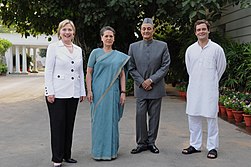
Rahul Gandhi: A Political Journey in the Indian National Congress
Rahul Gandhi: Political Journey, Congress Leadership, and Future Prospects
Introduction
Rahul Gandhi, a prominent Indian politician, is a key member of the Indian National Congress (INC) and part of the influential Nehru-Gandhi family. His political career began in 2004 when he contested and won the parliamentary seat from Amethi, Uttar Pradesh, a long-held family stronghold. Over the years, Rahul Gandhi has played a crucial role in shaping the INC’s leadership, policies, and electoral campaigns.
Key Highlights of Rahul Gandhi’s Political Journey
2004 – Entry into Politics
Rahul Gandhi officially entered Indian politics in 2004, contesting the Lok Sabha elections from Amethi, a constituency previously represented by his father, Rajiv Gandhi. He won the election with a significant margin, marking the beginning of his parliamentary career. His entry was seen as a move to uphold the legacy of the Nehru-Gandhi family within the Congress Party.
2007 – Youth Congress Leadership
In 2007, Rahul Gandhi was appointed as the General Secretary of the All India Congress Committee (AICC) and was given charge of the Indian Youth Congress (IYC) and the National Students’ Union of India (NSUI). His focus was on:
- Expanding the youth base of the party
- Introducing internal democratic reforms
- Encouraging young leaders to take up key roles within the organization
This phase established him as a leader focused on party revitalization and youth empowerment.
2009 General Elections: A Key Role in Congress’ Victory
The 2009 General Elections marked an important milestone for Rahul Gandhi. He was actively involved in leading the Congress campaign, focusing on youth engagement and grassroots mobilization. Under his leadership, the Congress-led United Progressive Alliance (UPA) secured a significant victory, winning 206 seats in the Lok Sabha. His efforts were credited with reviving the party’s influence, particularly in Uttar Pradesh.
2013 – Vice President of INC
In January 2013, Rahul Gandhi was officially appointed as the Vice President of the Indian National Congress. This move positioned him as the second-most powerful leader in the party, further cementing his leadership role. His appointment signified an attempt to bring in organizational changes, emphasizing:
- Strengthening the party structure
- Encouraging grassroots participation
- Focusing on key issues such as economic development, employment, and education
2014 General Elections: A Major Defeat
The 2014 Lok Sabha elections were a turning point in Rahul Gandhi’s political career. Leading the Congress campaign, he faced strong opposition from the Bharatiya Janata Party (BJP) under Narendra Modi. The election resulted in a historic defeat for the INC, as:
- The BJP secured 282 seats, forming a majority government
- The Congress was reduced to just 44 seats, its worst electoral performance
This defeat led to widespread criticism of Rahul Gandhi’s leadership, with many questioning the party’s strategy and direction.
2017 – President of INC
In December 2017, Rahul Gandhi was elected as the President of the Indian National Congress, succeeding his mother, Sonia Gandhi. His appointment was seen as an effort to revive the party, with a focus on:
- Strengthening the party’s grassroots network
- Countering the BJP’s dominance
- Modernizing party operations and communication strategies
2019 General Elections: Another Setback
Rahul Gandhi led the Congress campaign in the 2019 General Elections, positioning the party against the BJP on issues such as:
- Economic slowdown
- Unemployment
- Farmers’ distress
However, the Congress suffered another landslide defeat, with the BJP securing 303 seats. Additionally, Rahul Gandhi faced a personal setback, as he lost his traditional Amethi seat to BJP leader Smriti Irani. Despite this, he won from Wayanad, Kerala, ensuring his continued presence in the Lok Sabha.
Resignation as Congress President
Following the 2019 electoral defeat, Rahul Gandhi resigned as the Congress President, taking full responsibility for the party’s poor performance. He also called for a non-Gandhi leader to take charge, though the party later appointed Sonia Gandhi as the interim president.
2020-2023: Continued Political Influence
Despite stepping down as Congress President, Rahul Gandhi remains a key leader and influential figure within the party. His political activities have included:
- Leading opposition campaigns against the BJP on issues such as democracy, unemployment, and governance.
- Championing public outreach initiatives, including addressing social and economic issues affecting common citizens.
Bharat Jodo Yatra (2022-2023)
One of Rahul Gandhi’s most significant recent initiatives was the Bharat Jodo Yatra, a nationwide campaign launched in 2022. The yatra aimed to:
- Unite people against divisive politics
- Strengthen Congress’ grassroots connect
- Address socio-economic issues like inflation, unemployment, and religious harmony
This campaign garnered significant public attention and media coverage, positioning him as a leader committed to reviving the Congress Party.
Future Prospects
There is ongoing speculation about whether Rahul Gandhi will return as Congress President or support another leader. Regardless, he continues to be a central figure in the party’s decision-making and strategy.
Conclusion
Rahul Gandhi’s political journey has been marked by significant highs and lows, from his early successes in 2009 to the electoral challenges of 2014 and 2019. Despite resigning as Congress President, he remains one of the most influential leaders in Indian politics. His Bharat Jodo Yatra and continued political activism indicate that he remains committed to shaping the future of the Congress Party.
Reference Websites:
- The Hindu
- Times of India
- NDTV
- Hindustan Times
- Economic Times
- India Today